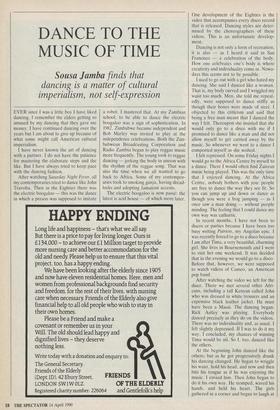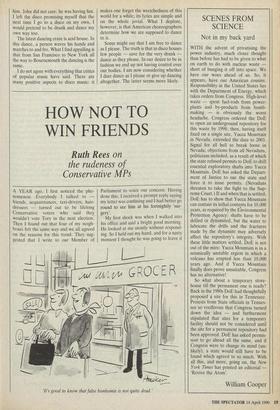DANCE TO THE MUSIC OF TIME
Sousa Jamba finds that
dancing is a matter of cultural imperialism, not self-expression
EVER since I was a little boy I have liked dancing. I remember the elders getting so amused by my dancing that they gave me money. I have continued dancing over the years but I am about to give up because of what some might call American cultural imperialism.
I have never known the art of dancing with a partner. I do not have the patience for mastering the elaborate steps and the like. But I have always tried to keep pace with the dancing fashion.
After watching Saturday Night Fever, all my contemporaries tried to dance like John Travolta. Then in the Eighties there was the electric boogaloo — this was the dance in which a person was supposed to imitate a robot. I mastered that. At my Zambian school, to be able to dance the electric boogaloo was a sign of sophistication. In 1982, Zimbabwe became independent and Bob Marley was invited to play at the independence celebrations. Both the Zim- babwean Broadcasting Corporation and Radio Zambia began to play reggae music more frequently. The young took to reggae dancing — jerking the body in unison with the rhythm of the reggae song. That was also the time when we all wanted to go back to Africa. Some of my contempor- aries took to smoking ganja, having dread- locks and adopting Jamaican accents.
The electric boogaloo is now passé: the latest is acid house — of which more later. One development of the Eighties is the video that accompanies every disco record that is released. Dancing styles are deter- mined by the choreographers of these videos. This is an unfortunate develop- ment.
Dancing is not only a form of recreation, it is also — as I heard it said in San Francisco — a celebration of the body. How one celebrates one's body is where creativity and individuality come in. Nowa- days this seems not to be possible.
I used to go out with a girl who hated my dancing. She said I danced like a woman. That is, my body curved and I wriggled my waist too much. Men, she told me repeat- edly, were supposed to dance stiffly as though their bones were made of steel. I objected to this criticism and said that being a free man meant that I danced the way I felt. Thereupon she insisted that she would only go to a disco with me if I promised to dance like a man and did not allow myself to get carried away by the music. So whenever we went to a dance I comported myself as she wished.
I felt repressed. On some Friday nights I would go to the Africa Centre by myself to a dance. There I would often find Zairean music being played. This was the only time that I enjoyed dancing. At the Africa Centre, nobody bothers with you: people are free to dance the way they see fit. So you can jump up and down or dance as though you were a frog jumping — as I once saw a man doing — without people minding. The feeling that I could dance my own way was cathartic.
In recent months, I have not been to discos or parties because I have been too busy writing Patriots, my Angolan epic. I was recently forced to go to a disco because I am after Tima, a very beautiful, charming girl. She lives in Bournemouth and I went to visit her one weekend. It was decided that in the evening we would go to a disco. Before that, however, we were supposed to watch videos of Cameo, an American pop band.
After watching the video we left for the disco. There we met several other Afri- cans, including a tall Kenyan called John who was dressed in white trousers and an expensive black leather jacket. He must have been a Masai. The dancing began: Rick Astley was playing. Everybody danced precisely as they do on the videos. There was no individuality and, as usual, I felt slightly depressed. If I was to do it my way, I concluded, my chances of winning Tima would be nil. So I, too, danced like the others.
At the beginning John danced like the others; but as he got progressively drunk his dancing changed. He began to wriggle his waist, hold his head, and now and then bite his tongue as if he was enjoying the music. I envied him. Then John began to do it his own way. He stomped, waved his hands, and held his heart. The girls gathered in a corner and began to laugh at him. John did not care: he was having fun. I left the disco promising myself that the next time I go to a disco on my own, I would pretend to be drunk and dance my own way too.
The latest dancing craze is acid house. In this dance, a person waves his hands and marches to and fro. What I find appalling is that from San Francisco to New York all the way to Bournemouth the dancing is the same.
I do not agree with everything that critics of popular music have said. There are many positive aspects to disco music: it makes one forget the wretchedness of this world for a while; its lyrics are simple and on the whole jovial. What I deplore, however, is that American choreographers determine how we are supposed to dance to it.
Some might say that I am free to dance as I please. The truth is that in disco houses few people — save for the very drunk dance as they please. In our desire to be in fashion we end up not having control over our bodies. I am now considering whether I dare dance as I please or give up dancing altogether. The latter seems more likely.



















































 Previous page
Previous page